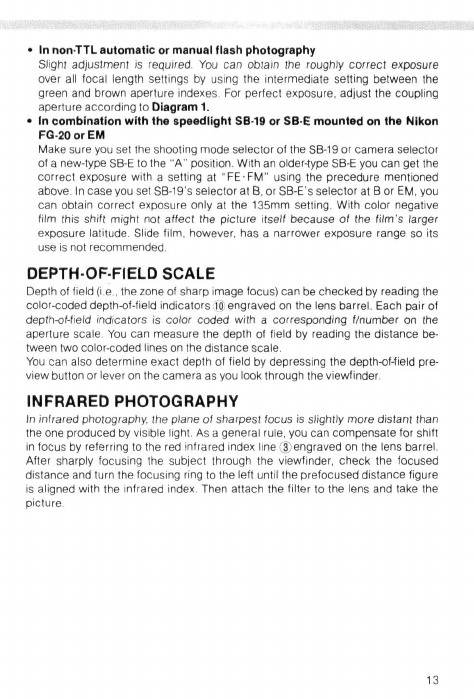
• In non-TTL automatic or manual flash photography
Slight adjustment is required. You can obtain the roughly correct exposure
over all focal length settings by using the intermediate setting between the
green and brown aperture indexes. For perfect exposure, adjust the coupling
aperture according to Diagram 1.
• In combination with the speedlight SB-19 or SB-E mounted on the Nikon
FG-20 or EM
Make sure you set the shooting mode selector of the SB-19 or camera selector
of a new-type SB-E to the "A" position. With an older-type SB-E you can get the
correct exposure with a setting at "FE-FM" using the precedure mentioned
above.
In case you set SB-19's selector at B, or SB-E's selector at B or EM, you
can obtain correct exposure only at the 135mm setting. With color negative
film this shift might not affect the picture itself because of the film's larger
exposure latitude. Slide
film,
however, has a narrower exposure range so its
use is not recommended.
DEPTH-OF-FIELD SCALE
Depth of field
(i.e..
the zone of sharp image focus) can be checked by reading the
color-coded depth-of-field indicators
.10;
engraved on the lens barrel. Each pair of
depth-of-field indicators is color coded with a corresponding f/number on the
aperture scale. You can measure the depth of field by reading the distance be-
tween two color-coded lines on the distance scale.
You can also determine exact depth of field by depressing the depth-of-field pre-
view button or lever on the camera as you look through the viewfinder.
INFRARED PHOTOGRAPHY
in infrared photography, the plane of sharpest focus is slightly more distant than
the one produced by visible light. As a general rule, you can compensate for shift
in focus by referring to the red infrared index line
(J) engraved
on the lens barrel.
After sharply focusing the subject through the viewfinder, check the focused
distance and turn the focusing ring to the left until the prefocused distance figure
is aligned with the infrared index. Then attach the filter to the lens and take the
picture.
13


















